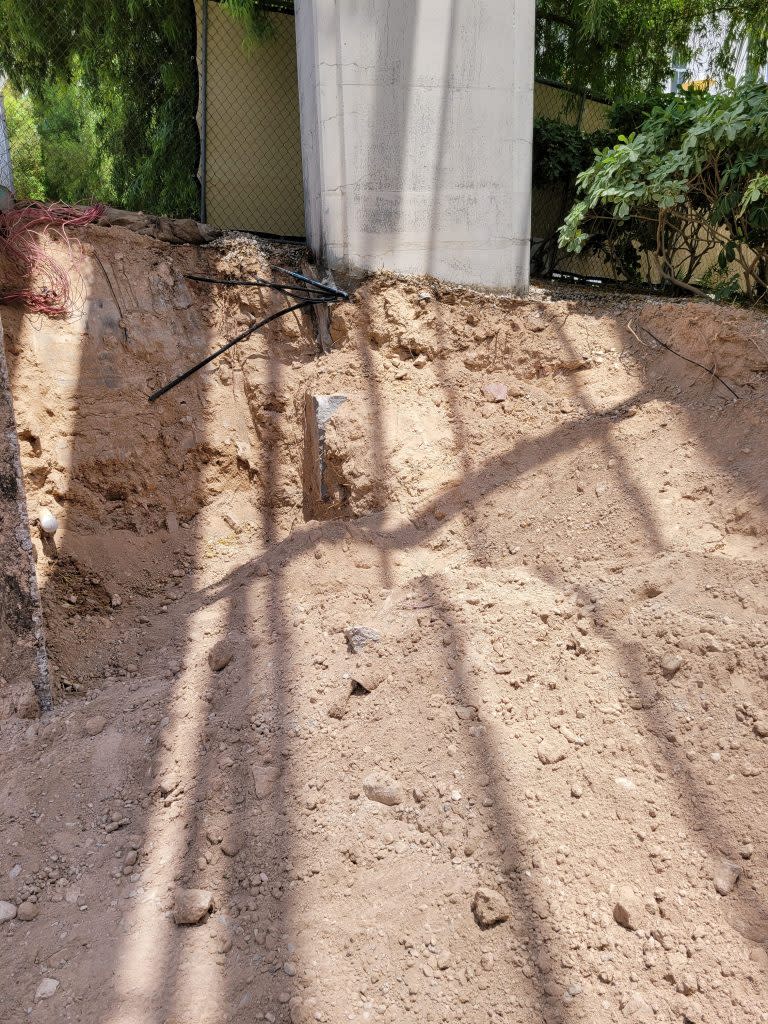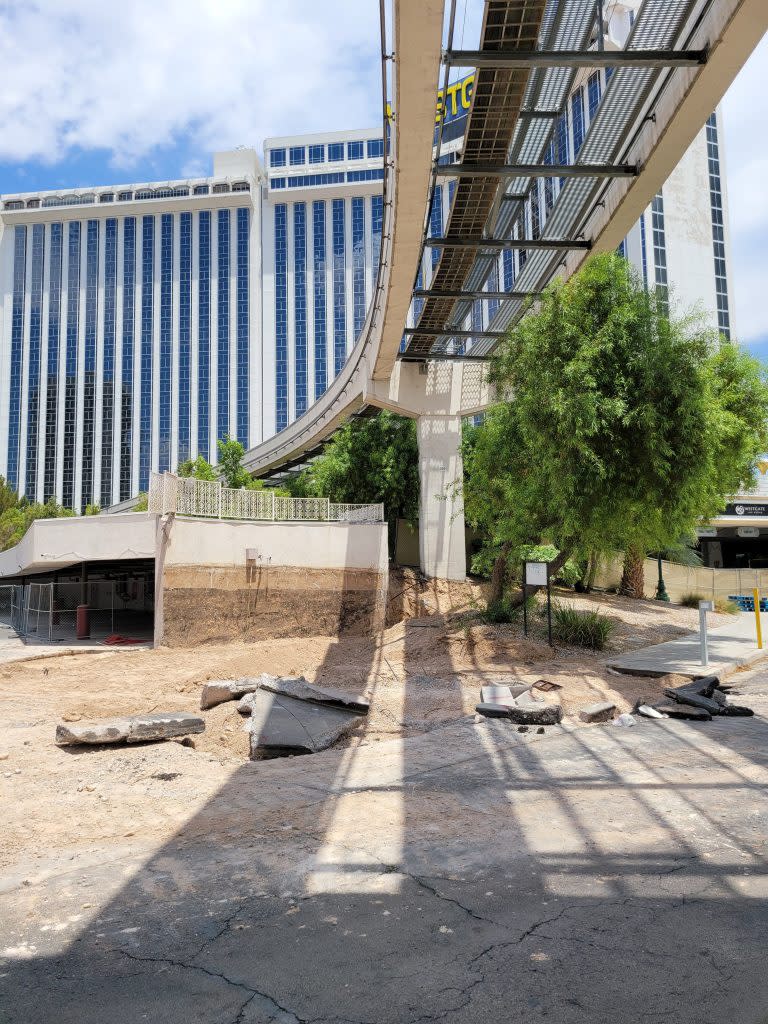Workers at Elon Musk’s Boring Co. accidentally dug too close to a supporting column of the Las Vegas monorail last year, forcing officials to briefly halt service
Workers at the Elon Musk–owned tunneling startup the Boring Company accidentally exposed the foundations of two pillars supporting Las Vegas's elevated monorail train last year, forcing county officials to temporarily halt service on the public transit system on at least one occasion, according to documents obtained by Fortune.
The incidents, which affected the monorail linking some of the most popular casinos and hotels adjacent to the famed Las Vegas “strip,” caused officials to briefly declare a portion of the monorail an “unsafe structure” in one violation notice issued in June.
The Boring Company is in the process of trying to dig a network of underground tunnels that will crisscross Las Vegas and, it hopes, eventually become a futuristic public transportation system for the city using autonomous electric vehicles. The revelation of the collateral damage to the monorail, which the Boring Company and county officials quickly fixed, comes on the heels of Fortune’s previous reporting about unsafe working conditions for employees of the privately owned Boring Company, which, according to its website, “creates safe, fast-to-dig, and low-cost transportation, utility, and freight tunnels.”
The first incident involving the Las Vegas monorail occurred on June 15, when Boring workers were searching for an irrigation pipe as they worked on the Boring Company tunnel between the Las Vegas Convention Center and the Westgate Resort and Casino, which has since been completed.
Near the valet entrance to the Westgate’s casino, a Boring employee was using a SANY machine, approximately the size of a small excavator, to cut through the gravel, earth, and landscaping, when a worker cut earth away from the base of one of the monorail columns—exposing the base of a column that supports the public transit system, according to violation and county records obtained by Fortune via a Freedom of Information Act request, photos taken before and after the incident that were shared with Fortune, and a former Boring employee who was working nearby at the time.
“You could see the corner of it,” says a former Boring Company employee who was working just nearby and arrived on site a few hours after the incident. The employee recalls a handful of men in suits arriving on-site some time after the incident, pointing and looking at the column.


Clark County regulators ordered the monorail, which had been running and transporting passengers that day, to cease operations while a third-party engineering firm was brought in to perform a structural assessment of the monorail and make sure the column wasn’t at risk, records show. The following morning, on June 16, a construction company covered the exposed area of the column with a cement mixture, according to the records. County officials kept the monorail shut down until 7:30 p.m. on June 16.
But a few months later, a similar incident occurred while Boring workers were attempting to grade the land—also on the Westgate property—this time exposing the base of Column 47, another monorail column nearby, according to another notice of violation that was issued mid-October. In total, Clark County issued three violations related to the two monorail incidents, accusing the Boring Company of doing grading work without a permit and creating a potential hazard by exposing the base of two monorail columns.
“Staff inspection findings include an exposed pilecap for Monorail,” one of the notices of violation regarding the October incident reads. “An existing structural foundation has been exposed, a potential hazard has been created.”
A spokesperson for the Las Vegas Convention and Visitors Authority, which purchased the monorail in 2020, said that in October, its monorail operations contractor "raised a concern that turned out to be unfounded" and that "there was no shutdown in October."
"In June 2023, TBC was fixing a broken irrigation line and inadvertently exposed a Monorail foundation, so we took the correct steps to repair that, including pausing operations for a day," the person said.
Both incidents add to a series of safety episodes that have taken place since the Boring Company began work to expand its existing tunnel system—currently a 2.4-mile, one-way underground conduit in which chauffeured Tesla cars transport tourists underneath the Las Vegas Convention Center—throughout the rest of the city of 640,000 people and the broader county. A Fortune investigation published in February found that an enormous concrete bin had collapsed right in front of the Las Vegas Convention Center after being overfilled, and that more than a dozen Boring Company workers have been burned by chemicals or otherwise injured in the tunnels during construction of a tunnel to the Wynn and Encore Resorts. Former Boring employees, including its safety manager, described how pressure to meet Musk’s lofty goals led to a disregard for safety, and employees reported incidents when employees could have died.
‘We put the public at risk’
The Las Vegas Monorail, which first started service in 1995, is one of the city’s most well-known public transit systems—transporting locals and visitors along 3.9 miles of the Las Vegas Strip between the MGM Grand Casino and the Sahara Las Vegas, including stops at the Convention Center and the Westgate Resort. Approximately 4.7 million people ride the monorail each year—equating to about 90,000 people per week, according to the LVCVA.
The former employee, who spoke to Fortune about the June monorail incident, had been working at the Westgate project site and was disturbed by the company’s error. “We put the public at risk for anybody who was on that monorail at that time,” the person said, noting that they felt that Boring managers seemed subsequently to be more focused “on getting things up and running to dig than [fixing] the problem that we caused.”
Clark County provided violations, permitting, and engineering letters, as well as photos associated with the incident, but had not responded to specific questions by the time of publication. A spokesperson for the Westgate Resort declined to comment. Boring Company and a representative of the engineering firm that worked at the site did not respond to Fortune’s requests for comment.
According to the Boring Company's latest permit applications, submitted earlier this year, the company is seeking to dig two tunnels between the University of Nevada at Las Vegas, near the Las Vegas airport, and the Convention Center. There are also several permits pending within the city limits of Las Vegas.
Do you have an insight to share? Got a tip? Contact Jessica Mathews at jessica.mathews@fortune.com or through the secure messaging app Signal at 479-715-9553.
More coverage from Fortune on safety at the Boring Co.:
- ‘We have consistently flirted with death’: Elon Musk wanted the Boring Co. to build a tunnel system below Las Vegas. Former employees say they feared for their lives while working there
- The CEO of the Las Vegas agency behind Boring Company’s first tunnel system says his team will be ‘more involved’ after safety incidents
This story was originally featured on Fortune.com